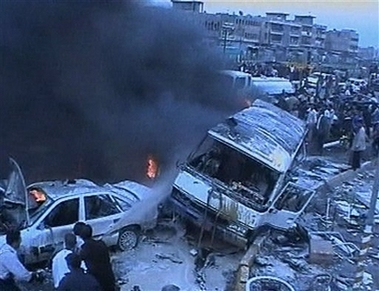Iraq attack death toll rises to 202
(AP)Updated: 2006-11-24 16:27
|
|
Baghdad - Iraqi officials and police said Friday that 202 people were killed and 252 were wounded in the bombing attack by Sunni-Arab insurgents on the capital's Sadr City slum.
The death toll, released by Rahim Qassim, a Health Ministry official in Sadr City, and police Col. Hassen Chaloub, was far higher than the one officials had given on Thursday night, when they had said that 161 Iraqis were killed and 257 wounded when insurgents blew up five car bombs and fired mortars into Baghdad's largest Shiite district. The dramatic attack sent the US ambassador racing to meet with Iraqi leaders in an effort to contain the growing sectarian war.
Two other mortar barrages on Sunni neighborhoods in west Baghdad killed nine and wounded 21, police said late Thursday.
The bloodshed underlined the impotence of the Iraqi army and police to quell determined sectarian extremists at a time when the Bush administration appears to be considering a move to accelerate the hand-over of security responsibilities. President Bush plans to visit the region next week to discuss the security situation with Iraqi Prime Minister Nouri al-Maliki.
"We condemn such acts of senseless violence that are clearly aimed at undermining the Iraqi people's hopes for a peaceful and stable Iraq," said Jeanie Mamo, a White House spokeswoman.
On Friday, about 300 mourners chanted as they beat their chests while walking through the Sadr City slum alongside slow-moving the cars and minivans carrying 16 wooden caskets tied to the rooftops.
Once the processions reached the edge of Sadr City in northeastern Baghdad, the cars and minivans left most of the mourners behind for the 100-mile drive south to Najaf, a treacherous journey that passes through many checkpoints and areas controlled by Sunni militants in Iraq's so-called "Triangle of Death."
Iraq's government imposed a curfew in the capital and also closed the international airport. The transport ministry then took the highly unusual step of closing the airport and docks in the southern city of Basra, the country's main outlet to the vital shipping lanes in the Persian Gulf.
Leaders from Iraq's Shiite, Sunni and Kurdish communities
issued a televised appeal for calm after a hastily organized meeting with US
Ambassador Zalmay Khalilzad. The US Embassy said it had nothing to report about
the session.
Al-Maliki, a Shiite, also went on state TV and blamed Sunni radicals and
followers of Saddam Hussein for the attacks on Sadr City -- the deadliest
on a sectarian enclave since the war began.
The coordinated car bombings -- three by suicide drivers and two of parked cars -- billowed black smoke up into clouds hanging low over blood-smeared streets jammed with twisted and charred cars and buses.
Hospital corridors and waiting rooms were awash in blood and mangled survivors of bombs that struck at 15-minute intervals in the sprawling Shiite slum, which is a stronghold of the Mahdi Army militia of radical anti-American cleric Muqtada al-Sadr, a key al-Maliki backer.
The militia and associated death squads are believed responsible for the slayings of hundreds of Sunnis since suspected al-Qaida in Iraq militants bombed a revered Shiite shrine in the city of Samarra last February.
| 1 | 2 |  |
|
||
|
||
|
|



